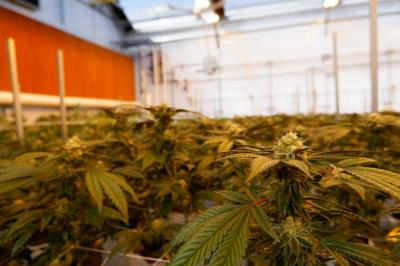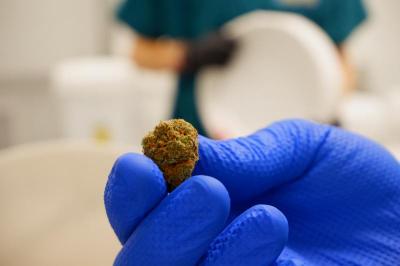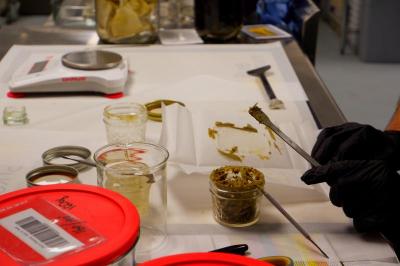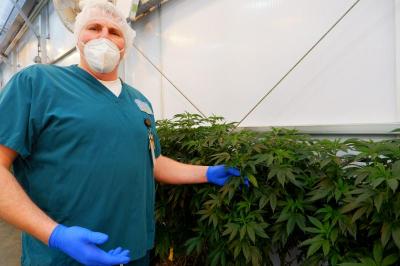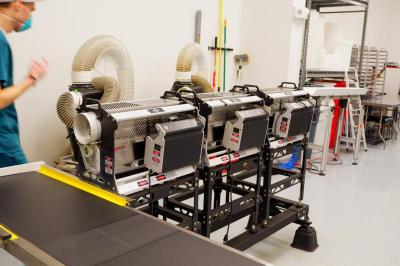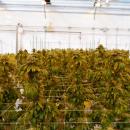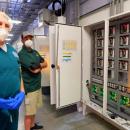Meet the Mattapoisett brigade behind Bask
MATTAPOISETT — Hey, what’s that smell?
Cinnamon, actually.
At Bask Sungrown Cannabis' cultivation facility in Freetown, CEO and Mattapoisett native Chappy Dickerson has odor-eliminating equipment that scents the air around the facility to smell, well, not like weed.
Dickerson runs Bask with fellow Tri-Town native Tim Keogh, originally from Marion. Dickerson’s fiance Melanie Dixon, who grew up across the street from Dickerson, acts as the financial advisor for the business.
Now, all three are living in Mattapoisett, just a couple miles from their Fairhaven dispensary and Freetown cultivation site.
Dickerson’s venture into legal cannabis began while he was stationed in Germany for the army, when on a visit to Amsterdam he first saw what legalized cannabis could look like.
But Dickerson’s relationship with the plant goes back further than his time in the service.
When he was a kid, Dickerson’s father was sent to prison on drug charges.
“I always feel like I got my childhood robbed,” Dickerson said.
So when Rhode Island first began offering licenses for legal cannabis sale, Dickerson jumped right on it.
Coming from a farming family and as a member of the Agricultural Commission, Dickerson said he’d always seen himself as a grower.
“I just look at it as another crop,” Dickerson said. “It just turns out I’m better at growing marijuana than lettuce.”
Dickerson said he’s always wanted to have an operation in Mattapoisett, but so far hasn’t been able to.
He added that anytime he’s lived outside Mattapoisett, the town has called him back.
On top of his roles on the Mattapoisett Agricultural and Conservation Commissions, Dickerson is also a firefighter.
“I’d like to say I’m a townie,” he said.
He was on the Agricultural Commission in 2015, when Mattapoisett became a “Right to Farm” community, but when the measure passed at Town Meeting, cannabis was omitted.
“It’s unfortunate that Mattapoisett and other towns here have been even slower than the rest of the state,” Keogh said.
He added that it’s inevitable that people in the Tri-Town will use cannabis and that “the question is, where are they getting it from?”
But for Dickerson, a dispensary in Fairhaven is close enough. He added that Bask has found a “very supportive home” there.
Bask first got started when Massachusetts legalized medical cannabis use, and Dickerson and Keogh reconnected after their time as high school friends in the Tri-Town.
Initially, Dickerson tried to get the dispensary set up in New Bedford. But, like in the Tri-Town, it never panned out.
So when Bask first started serving customers in 2018, it both grew and sold cannabis in Fairhaven.
Eventually, the cultivation site moved out to Freetown, where the operation grew five times in size.
What started out as just three employees has grown to a 70-person operation.
Now, its cultivation site in Freetown produces cannabis that gets distributed to dispensaries from Provincetown to Williamstown.
Cannabis at the site gets both natural light when the sun can provide it, and artificial light when the sun is gone. That way, Bask can both give the plants the sunlight they need, and control the operation enough to ensure year-round harvests.
“It turns out the plant likes the sun,” Keogh said. “People had to grow indoors because they had to hide it.”
In February, Bask’s Fairhaven Dispensary opened its doors for adult recreational sale, and Keogh said winning over Fairhaven’s officials was a tough task.
“It was a lot harder to tell people what we wanted to do before we were doing it,” Keogh said.
Dickerson noted that the business had to face down a lot of stigma about cannabis, and win over people who didn’t want cannabis in town.
But one of the things that won people over, Keogh said, was that “we’ve been operating here for two years and you didn’t even know it.”
Wary townspeople weren’t the only problems facing Bask, though.
There are few local cannabis operations on the South Coast, and Bask had to find its footing competing against companies moving in from states where cannabis had already been legalized.
Additionally, the company had to find funding to get started, which Dickerson said “was one of the hardest things I’ve ever done.”
“But we made it out of the gauntlet,” Dickerson said.
“Against all odds,” Keogh added.
Instead of one or two large investors, Bask is supported by several smaller investors, which Dickerson said gives him the ability to make more of his own decisions.
Dickerson said the operation is “almost like the local produce movement.” As with other local farms, people appreciate being able to communicate directly with growers.
“If somebody has a complaint, it’s not like they have to call somebody in Canada,” Dickerson said. “I’ve had people come to my house to ask me questions.”
As for the company’s future, Dickerson and Keogh said that they are currently working on permitting for a new dispensary in Taunton, and preparing to further expand the cultivation site in Freetown.




